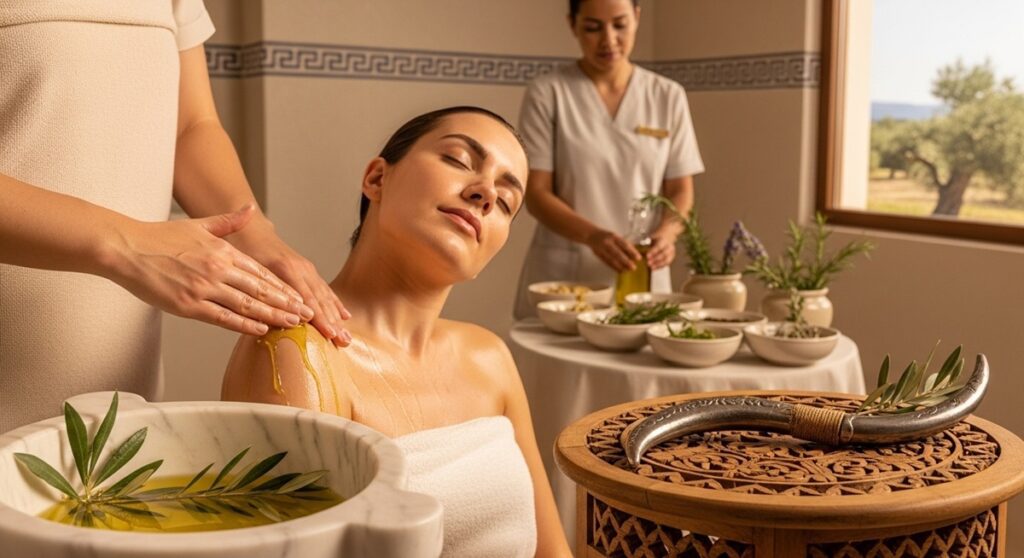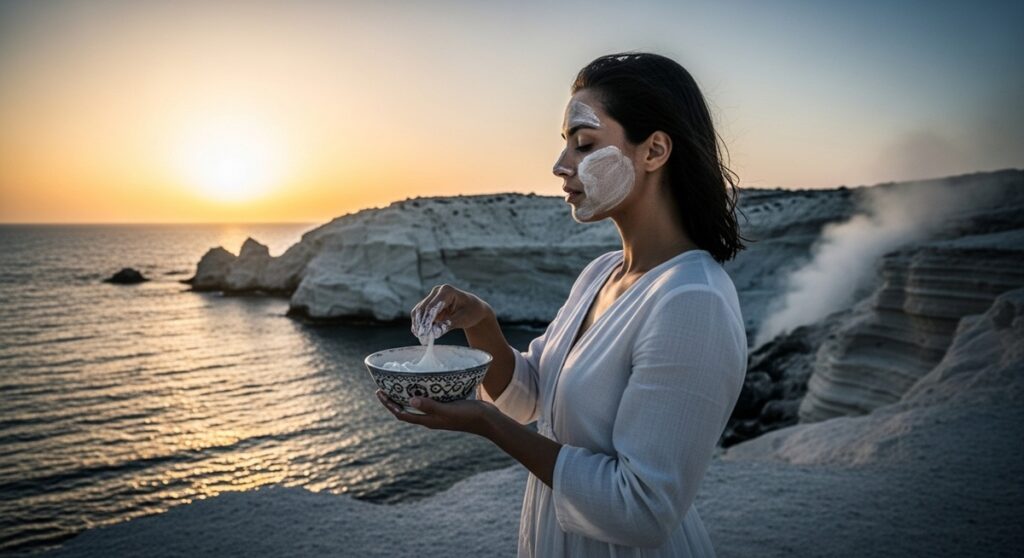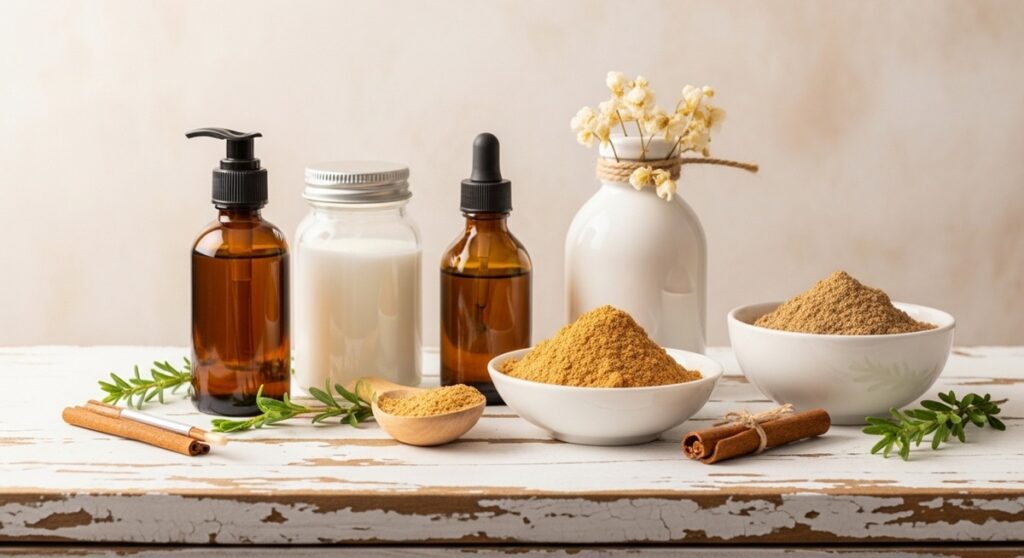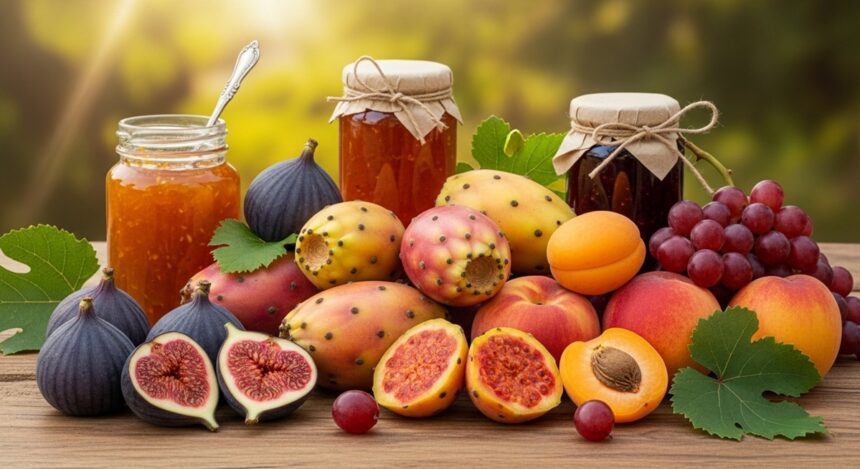In the sun-drenched landscapes of ancient Greece, beauty wasn’t merely a superficial pursuit—it embodied a profound philosophy of harmony, vitality, and divine grace. The Greeks coined the term kallos to describe this ideal, blending physical allure with inner balance and spiritual well-being. At the heart of this ethos stood Aphrodite, the goddess of love, desire, and sensuality, who emerged from the sea foam near Cyprus, her form a testament to eternal radiance. This mythical birth inspired practical beauty rituals that harnessed nature’s bounty—olive groves, aromatic herbs, mineral-rich clays, and the purifying essence of the sea.
Fast-forward to today, and these ancient Greek beauty secrets thrive in Greek spas, wellness retreats, and even everyday home routines. From luxurious olive oil massages in Crete to herbal infusions sold in Athens’ bustling markets, the legacy of Aphrodite bridges millennia, offering modern seekers a path to timeless self-care. Whether you’re a traveler chasing mythical vibes or someone crafting DIY elixirs at home, these practices remind us that true beauty is about nurturing the body as a temple, honoring both myth and modernity.
Aphrodite’s Myth and the Birth of Beauty
The story of Aphrodite begins with chaos and creation. According to Hesiod’s Theogony, she rose from the frothy waves after Cronus castrated Uranus, her body glistening with pearls, flowers, and an otherworldly glow. This origin tied her inextricably to the sea, symbolizing purity, renewal, and irresistible allure. Worshipped across the Aegean islands—particularly Cyprus, Crete, and Kythera—Aphrodite wasn’t just a deity of romance; she represented the ultimate standard of beauty standards in ancient Greece, where symmetry, light skin, and harmonious proportions were prized.
Archaeological finds, like vases depicting her rituals, reveal how devotees honored her through beauty rituals involving offerings of roses, myrtles, and seashells. Temples dedicated to her, such as the one at Paphos in Cyprus, hosted festivals where participants bathed in scented waters and anointed themselves with oils, believing these acts invoked her favor. Even men partook, as beauty in Greece transcended gender—athletes oiled their bodies for both protection and aesthetic appeal.

Today, pilgrims flock to Aphrodite’s Rock (Petra tou Romiou) in Cyprus, where legend says she first touched land. Splashing in the waves here isn’t just fun; it’s a nod to the goddess’s “birth bath,” a ritual echoed in modern spa treatments that use sea salts and foams for detoxification. This connection underscores how Greek mythology infuses contemporary wellness, turning ancient tales into actionable paths for radiance.
Symbols of Aphrodite: Nature’s Gifts for Beauty
Aphrodite‘s emblems—doves, swans, apples, pomegranates, and especially roses and myrtles—weren’t arbitrary. These elements formed the backbone of ancient beauty practices. Roses, for instance, were crushed into waters for toning the skin, while myrtle leaves infused baths with scents symbolizing eternal youth. Pomegranates, rich in antioxidants, were eaten and applied topically for vitality, prefiguring today’s superfood trends.
In rituals, priestesses might burn frankincense or offer honey-sweetened wine, blending sensory pleasures with spiritual devotion. These acts aligned the mortal form with divine perfection, a concept that resonates in today’s mindfulness-infused beauty routines.
The Golden Elixir: Olive Oil
No discussion of ancient Greek beauty is complete without olive oil, dubbed “liquid gold” by Homer. Harvested from sacred groves dedicated to Athena (and often linked to Aphrodite through shared rituals), this versatile elixir was central to daily care. Ancient texts, like those from Hippocrates, praise it as a healer, moisturizer, and protector against the harsh Mediterranean sun.
Greeks applied olive oil post-bath to lock in moisture, massaged it into muscles for relaxation, and used it as a base for hair treatments to impart shine and strength. Infused with herbs, it became perfumed unguents worn by both sexes. Athletes in the Olympic Games scraped off dirt and sweat with strigils after oiling up, a precursor to modern exfoliation.

In contemporary Greece, olive oil reigns supreme in spas. At places like the Anazoe Spa in Costa Navarino, therapists blend it with local herbs for massages that soothe and hydrate. Travelers to Crete can join olive harvest tours, then indulge in treatments at luxury resorts like those in Elounda, where warm olive oil drips revive tired skin. Scientifically, its oleic acid and vitamins E and K explain its efficacy—nourishing cells, reducing inflammation, and combating aging.
Modern Twists on Olive Oil Rituals
Beyond spas, olive oil stars in global skincare lines inspired by Greece. Brands like Korres incorporate it into creams and serums, proving its timeless appeal. For home use, mix it with sea salt for a scrub or honey for a mask—simple yet potent ways to channel Aphrodite‘s glow without leaving your bathroom.
The Power of Herbs and Flowers
The mythical gardens of Aphrodite brimmed with fragrant botanicals, each chosen for their beautifying properties. Rose petals softened skin and scented perfumes, while myrtle, her sacred plant, featured in love potions and bath additives for its astringent qualities. Chamomile calmed irritations, laurel (bay leaves) cleansed, and thyme purified, forming the basis of infusions and poultices.

Ancient women brewed these into teas for internal health or applied them topically, much like today’s herbal remedies. Excavations at sites like Knossos in Crete uncover tools for grinding herbs, hinting at sophisticated routines. Even saffron, harvested from crocuses, was used for brightening complexions—a luxury item traded across the Mediterranean.
In modern Greece, these traditions flourish. Athens’ Plaka markets sell bundles of dried chamomile and rose water bottles, evoking ancient recipes. Spas in Thessaloniki offer herbal facials with lavender and rosemary, drawing on Hippocratic principles. Research backs their benefits: Chamomile‘s anti-inflammatory compounds soothe acne, while rosemary boosts circulation for healthier hair.
Herbal Infusions: From Temple to Table
For a deeper dive, consider how Greeks sipped herbal teas for beauty from within. Sage for detoxification or oregano for antioxidants—staples in village homes. Travelers can forage (with guides) in the Peloponnese, then brew blends that promote that inner kallos.
Clay and Mineral Baths: The Goddess’s Spa
Greece’s volcanic terrain gifted mineral-rich clays and thermal springs, revered as earthly manifestations of divine healing. In Milos, white kaolin clay was mined for masks that drew out impurities. Lesvos’ hot springs rejuvenated weary bodies, and Kos, home to Hippocrates, touted mineral baths for therapeutic beauty.
These were rituals aligning with Aphrodite‘s sea-born purity. Clays detoxified, minerals like sulfur and magnesium restored balance, prefiguring hydrotherapy.

Today, clay baths in Milos attract eco-tourists, slathering on volcanic mud for silky skin. Edipsos’ thermal pools offer similar immersion, with spas adding essential oils. Globally, Greek-inspired mud wraps appear in high-end retreats, their bentonite clay absorbing toxins while hydrating.
The Science Behind Earthly Elixirs
Studies show clays’ antimicrobial properties fight blemishes, and mineral baths improve circulation. In Greece, places like Loutraki combine these with yoga for holistic wellness, embodying ancient Greek harmony.
Perfume of the Gods
Scent was sacred in Greece, with perfumes crafted from olive oil, resins, wines, and botanicals like saffron, frankincense, and roses. Aphrodite‘s devotees wore these to evoke her allure, as amphorae residues confirm.

Artisanal perfumers in Athens and Santorini revive this, blending myth-inspired scents. Workshops let visitors create custom fragrances, linking past and present.
Modern Spas: Where Myth Meets Luxury
Greece’s spas fuse antiquity with opulence. At Euphoria Retreat in Mystras, olive oil massages and herbal facials draw on Spartan traditions. Santorini’s volcanic spas offer clay wraps, while Rhodes’ healing pools echo ancient rituals.
These spots brand around Aphrodite, offering sea salt scrubs and aromatic baths for transformative experiences.
Beauty as Philosophy
Kallos meant more than looks—it was ethical, tying beauty to virtue and nature. Aphrodite embodied this, urging balance.
In Crete’s villages or Milos’ sands, travelers find this philosophy alive, sipping teas or walking barefoot.
Timeless Rituals for Modern Travelers
These secrets—olive oil, herbs, clays—connect eras. In Athens’ markets or Crete’s waters, Aphrodite‘s mirror reflects eternal beauty.
Secrets from Aphrodite’s Mirror: Homemade Greek Beauty Rituals

Recreate ancient rituals at home with nature’s gifts.
Aphrodite’s Glow Mask (Olive Oil & Honey)
For hydration: Mix 1 tbsp olive oil, 1 tbsp honey, lemon drops. Apply 15 mins. Honey’s humectant locks moisture.
Hera’s Herbal Hair Rinse (Rosemary & Chamomile)
Steep 2 tbsp each in water. Rinse post-shampoo. Rosemary vitalizes; chamomile softens.
Myrtle & Rose Water Toner
Infuse myrtle in rose water. Dab for balance. Symbols of youth.
Clay of Milos Face Mask
Blend clay, yogurt, olive oil. Cleanse deeply. Yogurt exfoliates.
Sea Salt & Olive Oil Body Scrub
Mix salt, olive oil, lavender. Exfoliate for radiance.
Additional Rituals: Yogurt Brightening Pack
Apply Greek yogurt for lactic acid glow.
Saffron Elixir for Complexion
Infuse saffron in water; tone for brightness.
Each ritual fosters self-love, rooted in myth.
In embracing these, we honor Aphrodite‘s legacy—beauty as eternal harmony.






















